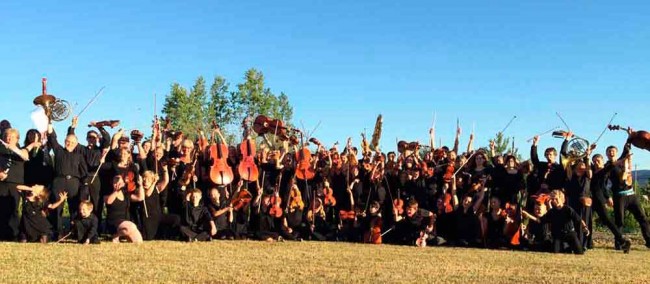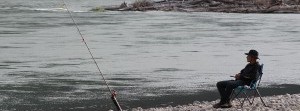
Photo Credit: Karen Price
Orchestra North: summer music program is serious fun
The audience hushes as the conductor and co-director stride down the aisle. At the front of the room, the orchestra members fall quiet. After some introductory remarks, the conductor raises her baton and the concert begins.
This is serious classical music. Tonight’s program includes pieces by Beethoven, Berlioz and Bruch. The musicians are deep in concentration, simultaneously reading their scores and watching the conductor. The audience sits in rapt attention, some with eyes closed as they take in the complex harmonies.
But wait—there’s something familiar here. Didn’t you see some of these same musicians square dancing on Main Street a day or two ago? You recognize others from a soccer scrimmage in a nearby park. You saw some of them out for a hike on the mountainside just the other day—and weren’t they carrying musical instruments? Come to think of it, haven’t there been a lot of classical concerts, large and small, springing up all over town the past week?
Welcome to the Orchestra North Summer Program, a classical music intensive for musicians of all ages from across northern BC that is fostering the region’s musical culture while embracing its community spirit.
Genesis of a music program
Orchestra North was founded by Roxi Dykstra, an internationally renowned professional violist and violinist who grew up in Houston, BC. I first met Roxi in 1993 when we were both performing in the orchestra of a local production of The Messiah. She was just 10, but I was impressed by her spunky enthusiasm and spirit—not to mention her proficiency on the viola, which seemed nearly as big as she was. As the youngest among 120 musicians who were part of the show, she more than carried her weight.
“It was in large part that experience that inspired me to start Orchestra North,” Dykstra told me recently by phone from Lisbon, Portugal where she has a four-month contract playing viola with the Portuguese National Symphony. “It was such a powerful experience for me to be around all those musicians, playing challenging music, learning from each other and forming lasting bonds. As an adult, I realized I want to help provide that experience for other northern musicians.”
In 2012, Dykstra organized a Smithers-area production of Vivaldi’s Gloria, with an orchestra and a choir of 100 voices. “Guest musicians and others from outside the area were so impressed with the quality of our musicians. They’d ask, ‘How does your orchestra have so much enthusiasm? How do you even have an orchestra?’”
Sebastian Ostertag, former principal cellist of the Prince George Symphony, had worked with Dykstra on a number of musical projects there and developed a tremendous respect for her talents and energy. He was quick to jump on board when she described her concept for Orchestra North.
The following summer the first Orchestra North Summer Program took place in Smithers, attracting some 45 participants and several professional musicians as instructors. The week was a great success and the following year enrolment jumped to 70. Last year it was nearly 100.
“The people who took part wanted to come back,” Dykstra says. “My professional colleagues who were instructors are super eager to see this kind of development for young musicians and they want to take part, too. As a result, the level of musicianship among the instructors is very high.”
The weeklong program includes a variety of instruction, from basic instrument skills to playing in ensembles of various sizes. Children as young as seven may join. Adults who have played an instrument in the past are encouraged to take it up again. Beginner and intermediate players are placed in orchestras and ensembles matched to their ability for instruction and fun music-making. More advanced students can audition for the symphonic program.
To keep things well rounded, informal activities are included during the week, such as square dancing, soccer and hiking.
One of the experience highlights is the opportunity to meet other music students from the region. Musicians have come from as far as Dunster and remote islands off the BC coast. “As much as we can, we want to remove barriers to participation,” Dykstra explains. “All ages and skill levels are welcome. Thanks to generous local sponsorship we can keep the costs down and bursaries are available.
“The reason we can pull this off is because of the big heart of the community.”
Breaking barriers
“When I was a kid, I had to go to Vancouver for musical development of this calibre,” she adds. “Growing up in the North, I’ve experienced a prejudice against isolated and rural areas—that we can’t produce high-quality music and musicians. This is another barrier I’m determined to break.”
Participants get a number of chances to perform in a variety of settings. One of the most popular is Classics on Main, where some 18 different ensembles, comprising all participants at every skill level, rotate short performances among eight different street venues in downtown Smithers.
“Rain can make this challenging,” Dykstra laughs. “The string instruments are held together with water-soluble glue.”
The program has grown and evolved over its few short years. This year, the number of performances has doubled from last year and includes The Spirit of the North Classical Music Festival, which takes place Aug. 11-13 with 10 concerts featuring internationally renowned soloists, local favourites, chamber music and orchestra concerts, and the Orchestra North symphony concert as the finale.
Ostertag has worked with Dykstra each year as an instructor and co-director. He likes the way Orchestra North builds community.
“It can be lonely playing music if you’re just stuck in a practice room,” he says. “This program puts musicians together, drawing from an enormous geographical area—basically the size of Germany.”
Ostertag and Dykstra have organized a similar but smaller version of the BC program in Owen Sound, Ont. “Last year was a pilot project, but it was successful and we will do it again in 2016,” Ostertag says.
Long-term results
Another component of Orchestra North is its Academy Program, which puts the best young players together with professional musicians for a week before the regular program. They work together in small chamber groups, developing skills and repertoire before touring to perform in various northern communities. These young musicians gain experience and become teaching assistants during the following week.
Young violinist Kiri Daust has thrived from his participation in Orchestra North and the Academy Program.
“It is absolutely amazing!” he enthuses. “It’s by far the best music camp I’ve been to. Not just the music experience, but the bonding among musicians and the forging of networks.”
Currently doing post-secondary studies in Squamish, he says he will be back for this year’s program.
“I would like to keep doing it as long as I can. I definitely want to do some music teaching and maybe direct an orchestra.”
The Summer Program could not happen without the help of many people. Thea Ewald, who Dykstra describes as a “volunteer extraordinaire,” shoulders the bulk of the event’s organizational responsibilities.
“Let’s face it: musicians aren’t always the best organizers,” Ewald says. She offered her help the first year and found there was a lot to do, “everything from organizing venues to finding missing instruments.” She is amazed each year at the transformation from the chaos of Monday morning to the finished product of Friday evening when some 100 instrumentalists join forces in one mass symphony for a final performance.
Although the Orchestra North program is only active for two weeks each year, Dykstra says it produces long-term results. Participants form lasting connections with other northern musicians and with their instructors. Young students become advanced students and in turn help less-experienced players.
“Above all, this musical experience builds stronger and better communities. It makes us better and more compassionate people,” she says. “Our main challenge in the North is not any lack of talent, interest or resources, but is in our geography and how dispersed we are. Orchestra North is overcoming this challenge by bringing people together through music.”
Join in the band
Anyone interested in joining Orchestra North can register online at www.orchestranorth.com. For a paper registration, email admissions@orchestranorth.com. For more information visit the website or Facebook.com/OrchestraNorth, or phone 250-847-2186.
This year’s early registration fee (until May 15) is $199, with normal registration set at $250. A family discount of $50 per additional family member is available and need-based bursaries are available upon request.







